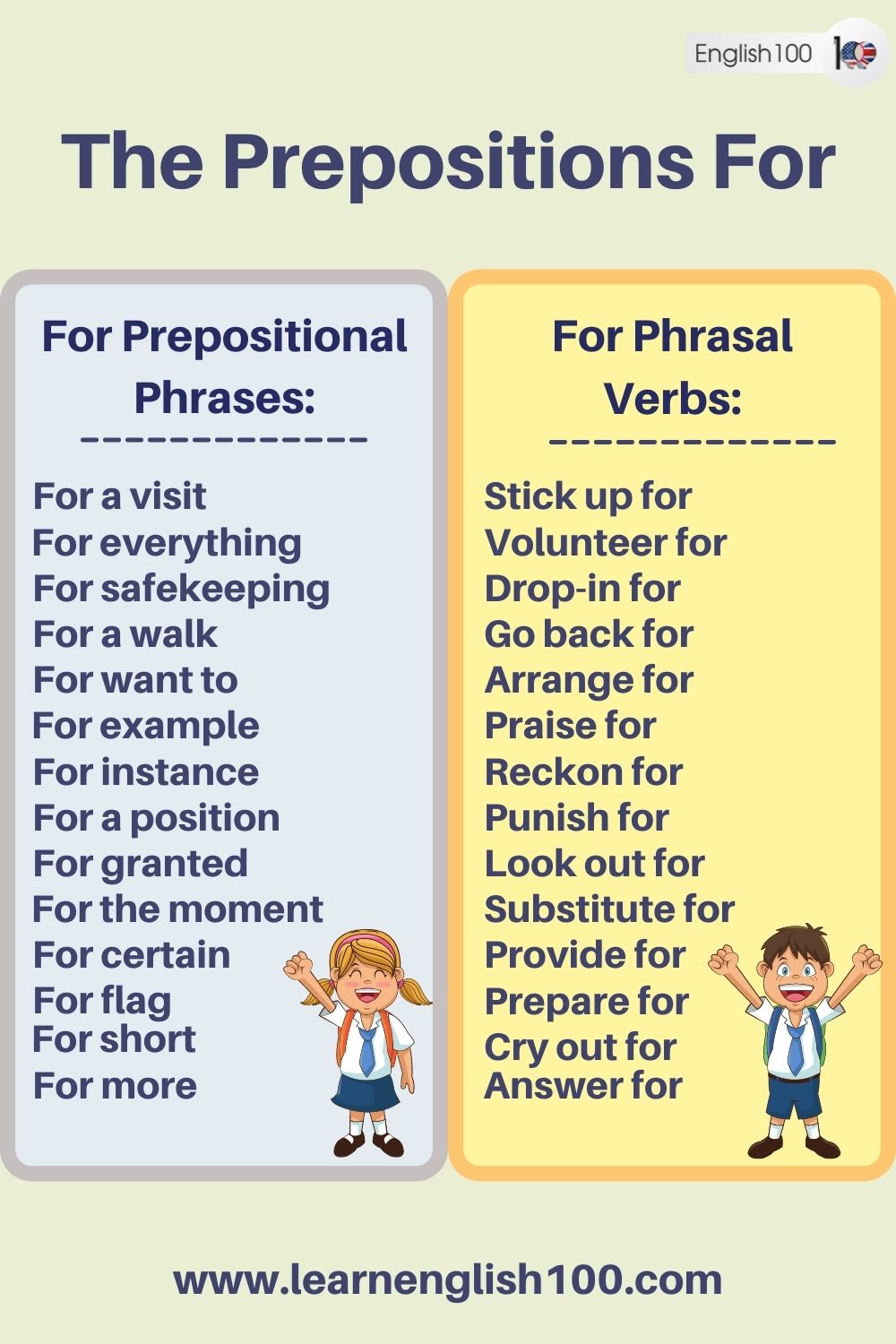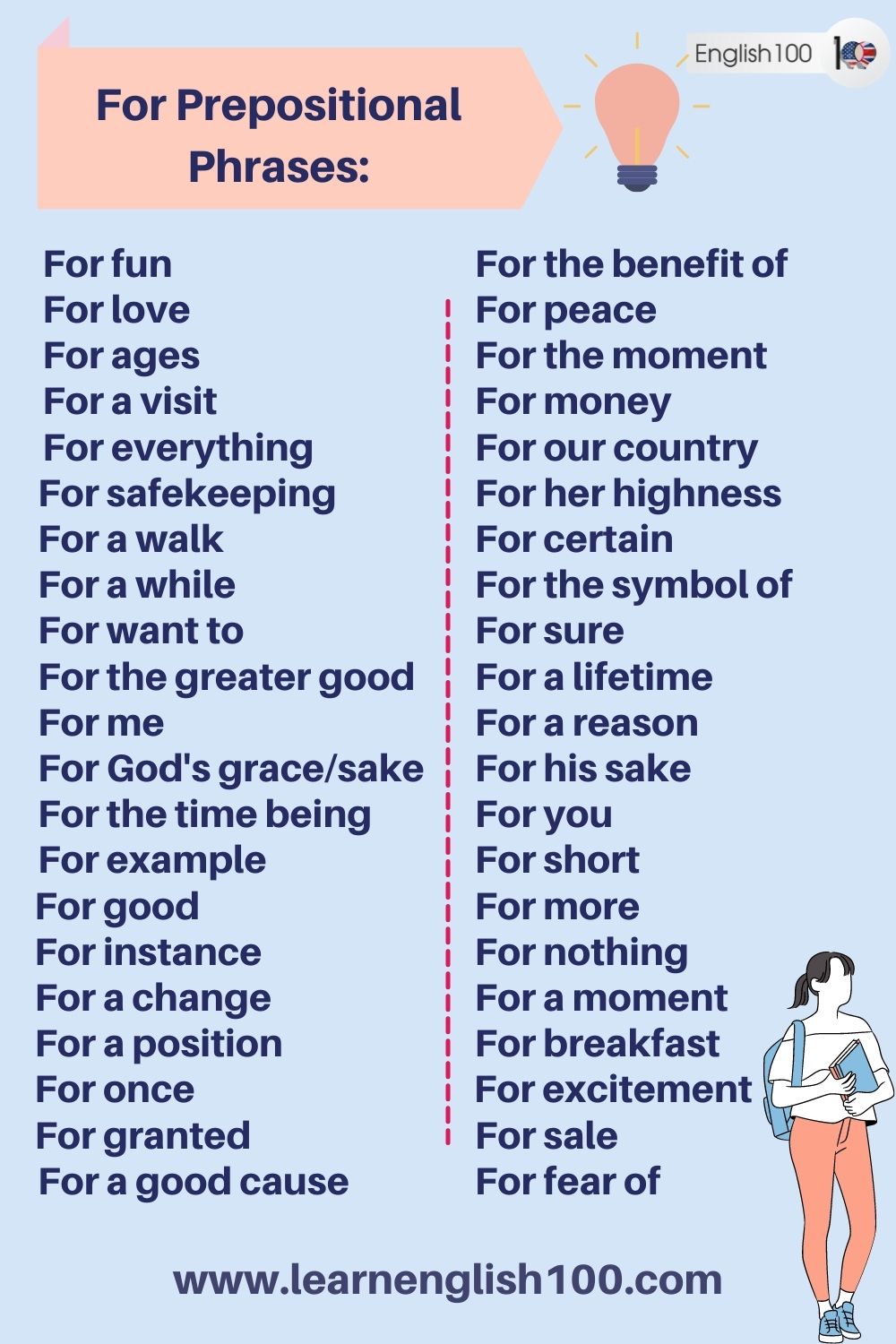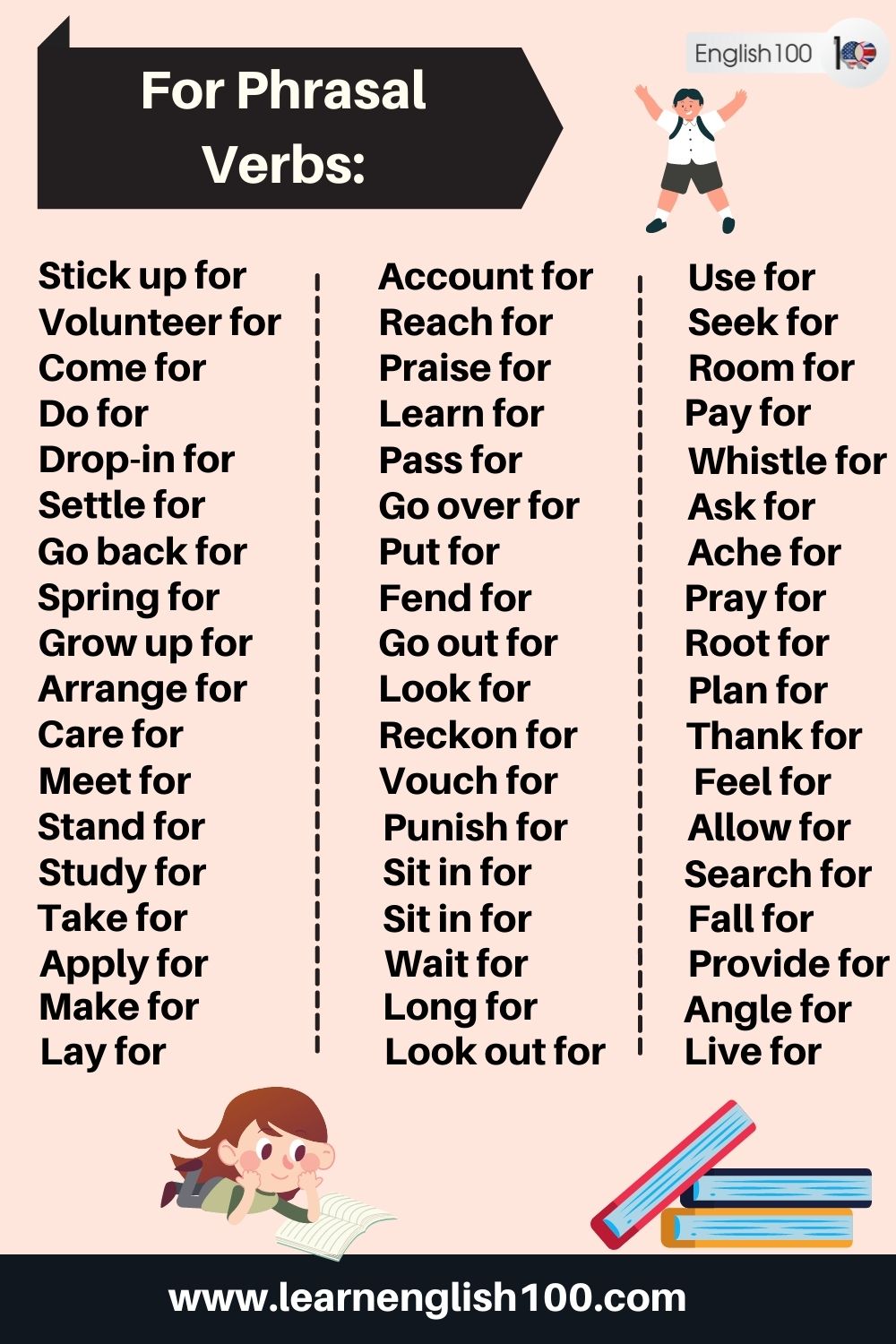


The Proper Use of “For” in English Grammar
The preposition for is used in a multitude of contexts and in numerous occasions. Let’s explore them.
For Prepositional Phrases:
For fun
For love
For ages
For a visit
For everything
For safekeeping
For a walk
For a while
For want to
For the greater good
For me
For God’s grace/sake
For the time being
For example
For good
For instance
For a change
For a position
For once
For granted
For a good cause
For the benefit of
For peace
For the moment
For money
For our country
For her highness/royal highness
For certain
For flag
For the symbol of
For real
For better or worse
For sure
Forever
For a lifetime
For a reason
For free
For his sake
For you
For short
For us
For more
For nothing = free or in vain
For now
For a moment
For breakfast – brunch – lunch – supper – dinner
For excitement
For sale – rental/hire
For fear of
For the rest of ……
For a living
For Phrasal Verbs:
Stick up for
Volunteer for
Come for
Do for
Drop-in for
Settle for
Go back for
Spring for
Get back at someone for
Arrange for
Care for
Meet for
Stand for
Study for
Take for
Apply for
Make for
Lay for
Grow up for
Account for
Reach for
Praise for
Learn for
Pass for
Go over for
Put for
Fend for (others – yourself)
Go out for
Look for
Reckon for
Vouch for
Punish for
Sit in for
Wait for
Long for
Look out for
Use for
Seek for
Room for
Pay for
Whistle for
Ask for
Ache for
Pray for
Root for
Plan for
Thank for
Feel for
Substitute for
Allow for
Search for
Fall for
Provide for
Angle for
Prepare for
Live for
Buck for
Cry out for
Send for
Answer for
Prepositions are a basic section of parts of speech. They are words that show movement from one place to another and the relationship between any two entities. There are several prepositions in English, including for, to, and from. But the most common preposition is for. “For” shows a certain type of relationship. The usage of for revolves around figuring out the reason behind the verb.
For is used to indicate three main things:
1 – The reason behind something.
I am angry for her. The way he treated her is completely cruel and unfair.
Samuel did his best for the charity to get some additional funding.
Julie watches TV for the economic updates only.
2 – To illustrate the duration of a certain action.
I stalled that man for about an hour.
Jasmine improved her teaching skills for a long time now.
Dave implemented his latest programming skills in the app he’s been developing for the past two years.
Taylor practices his serve twice a week for an hour and a half each time.
3 – To specify the benefit of a certain effort.
Hey! Bring the salt, I need some for the sauce.
This food is for the homeless and poor.
These roses are for Lily.
Playing cards is for amusement purposes only.
Magic is for those who want to be fooled.
The preposition “for” can be combined with verbs to form phrasal verbs or added to nouns to form prepositional phrases.
In the English language, there are many words that are exchangeable and can be used interchangeably most of the time. However, English learners tend to overextend the allowed jurisdiction of interchangeability. This happens particularly with “for” since it is extremely mixed up with prepositions of time. Also, you have to pay attention not mix from with form for the latter is not a preposition.
Prepositions are the architects of clarity, precision, and depth in communication. They give life to ideas, define relationships, and connect the dots of our thoughts. They are not mere linguistic adornments but essential tools for crafting meaning, constructing narratives, and sharing the beauty of human expression. 1
FAQ
What is the correct use to for?
The word “for” is a versatile preposition in the English language and has various uses. Here are some common ways “for” is used:
Purpose or Reason: “For” is often used to indicate the purpose or reason for an action or situation. For example:
I bought this book for studying.
She went to the gym for fitness.
Duration: It can indicate the duration of an action or event.
They traveled to Europe for two weeks.
Recipient or Beneficiary: “For” can show the person or entity that benefits from an action.
This gift is for you.
I made this cake for the party.
In Exchange: It can indicate an exchange or trade.
She traded her bicycle for his skateboard.
He paid $20 for the concert ticket.
Support or Favor: “For” can express support or favor.
I’m here for you.
Can you do me a favor?
In Place of: It can indicate something that substitutes for another.
He was the stand-in for the lead actor.
I used yogurt as a substitute for milk.
Comparison: “For” can be used to compare two things or quantities.
She’s tall for her age.
This car is fast for a sedan.
Proximity in Time: It can indicate a time close to the present or future.
I’ll meet you at the cafe for lunch.
We’re leaving for the airport in an hour.
Preparedness: It can indicate something that’s ready or intended to be used for a particular purpose.
Is the meal ready for serving?
The stage is set for the performance.
In Favor of: “For” can indicate support or preference for something.
I’m for stricter regulations.
He voted for the new policy.
These are some common uses of “for,” and its meaning can vary based on the context in which it’s used. Learning how to use “for” correctly in different situations is an important aspect of mastering English grammar and communication.
What is the rule for of in grammar?
In English grammar, the preposition “of” is a versatile word that is used in various ways. Here are some common rules and uses of “of” in grammar:
Possession: “Of” is often used to indicate possession or ownership. For example:
The book of John (John’s book)
The house of my parents (my parents’ house)
Origin or Source: It can indicate the origin or source of something.
A cup of coffee (coffee from a cup)
The water is from the well.
Partitive Genitive: “Of” is used to express a part of a whole.
A piece of cake (part of a cake)
Two out of five students (two students out of five)
Description or Characteristic: “Of” can describe the characteristics or qualities of something.
A man of honor (a man with the quality of honor)
A city of lights (a city with the characteristic of being illuminated)
Cause or Reason: It can indicate the cause or reason for something.
He died of cancer (the cause of death was cancer)
She cried out of happiness (the reason for crying was happiness)
Composition or Material: “Of” can specify the material or composition of something.
A table made of wood (the material is wood)
A necklace of pearls (composed of pearls)
Measure or Quantity: It can indicate measurement or quantity.
A bottle of water (measurement)
A group of people (quantity)
Time: “Of” is used to indicate the time.
The end of the day (the time when the day ends)
The middle of the night (the time when it’s midnight)
Belonging to a Category: “Of” can show that something belongs to a particular category or group.
A member of the team (belonging to the team)
A resident of the city (belonging to the city)
Expression of Amount: In some expressions, “of” is used to indicate an amount or proportion.
Half of the cake (50% of the cake)
A quarter of the students (25% of the students)
Particularity or Characterization: “Of” is used to describe a particular quality or characteristic.
A woman of great courage (characterized by courage)
An act of kindness (an action characterized by kindness)
Relationships: “Of” can indicate various relationships between words.
The capital of France (relationship between a city and a country)
The book of poems (relationship between a book and its content)
To conclude, these are some common rules and uses of “of” in English grammar. Understanding these uses helps in constructing meaningful and grammatically correct sentences. However, it’s important to note that the meaning of “of” can vary based on the context in which it is used.
- Bendwebs_Admin. (2023b, October 27). Prepositions – small (but important) words! SciTechEdit International.
